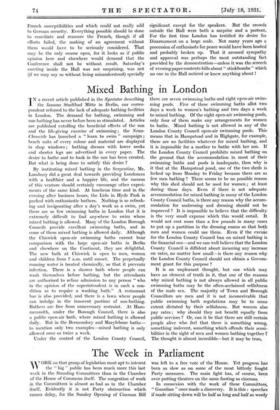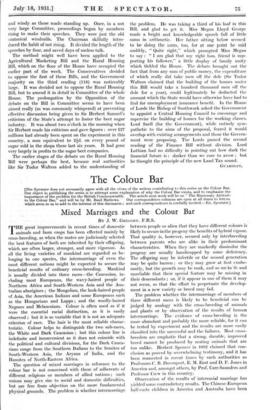The Week in Parliament ORK on that group of legislation
most apt to interest the " big " public has been much more this last week in the Standing Committees than in the Chamber of the House of Commons itself. The congestion of work in the Committees is almost as bad as in the Chamber itself. Evidently it is not Party obstruction which causes delay, for the Sunday Opening of Cinemas Bill was left to a free vote of the 'House. Yet progress has been as slow as on some of the most bitterly fought Party measures. The main fight has, of course, been over putting theatres on the same footing as cinemas.
In connexion with the work of these Committees, " Guardian " once made a discovery. It is this : speeches if made sitting down will be half as long and half as wordy and windy as those made standing up. Once, in a not very large Committee, proceedings began by members rising to make their speeches. They were just the old oratorical windmills. The Chairman skilfully intro- duced the habit of not rising. It divided the length of the speeches by four, and saved days of useless talk.
The method might well have been applied to the Agricultural Marketing Bill and the Rural Housing Bill, which on the floor of the House have occupied the earlier part of the week. The Conservatives decided to oppose the first of these Bills, and the Government majority on the third reading (118) was noticeably large. It was decided not to oppose the Rural Housing Bill, but to amend it in detail in Committee of the whole House. The prolongation by the Opposition of the debate on the Bill in Committee seems to have been aimed really (as was commonly whispered) at preventing effective discussion being given to Sir Herbert Samuel's criticism of the State's attempt to foster the beet sugar industry. It was about two o'clock in the morning when Sir Herbert made his criticism and gave figures : over £27 millions had already been spent on the experiment in this country, a sum equivalent to 24d. on every pound of sugar sold in the shops these last six years. It had gone very largely in profits to the sugar beet companies.
The earlier stages of the debate on the Rural Housing Bill were perhaps the best, because real authorities like Sir Tudor Walters added to the understanding of the problem. He was taking a third of his loaf in this Bill, and glad to get it. Miss Megan Lloyd George made a bright and knowledgeable speech full of little sums in arithmetic. Her father sitting below seemed to be doing the sums, too, for at one point he said audibly, " Quite right," which prompted Miss Megan to say : " I am glad that my right hon. friend is sup- porting his follower," a little display of family unity which tickled the House. The debate brought out the fact that from any sum of public money, the expenditure of which really did take men off the dole (Sir Tudor Walters claimed that the building of the houses under this Bill would take a hundred thousand men off the dole for a year), could legitimately be deducted the amount which the State would have otherwise have had to find for unemployment insurance benefit. In the House of Lords the Bishop of Southwark asked the Government to appoint a Central Housing Council to encourage and supervise the building of houses for the working classes. Lord Snell (for the Government), while entirely sym- pathetic to the aims of the proposal, feared it would overlap with existing arrangements and those the Govern- ment were proposing. The Lords passed the second reading of the Finance Bill without division. Lord Lothian had no difficulty in pointing out how dark the financial future is : darker than we care to avow ; but he thought the principle of the new Land Tax sound.
GUARDIAN.



































 Previous page
Previous page